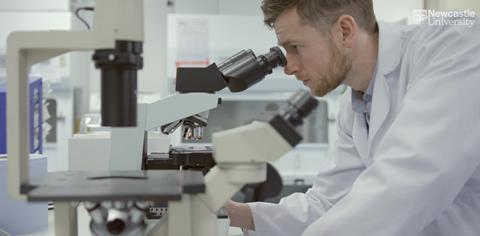The Stewart Lab and the wider ‘Newcastle Neonatal Nutrition and NEC’ (N4) research group based at Newcastle University are working to harness the infant gut microbiome to predict disease and personalise preventative therapy.
The human gut microbiome is undoubtedly important across the life course, but perhaps no more so than during the first year of life. This critical period sees infants colonised with viable microbes for the first time and, thereafter, the gut microbiome develops more dynamically than during any other stage of life. This development does not happen in isolation, but rather in a complex concerto with the host epithelium and immune system. Abnormal development of the gut microbiome over the first year of life can therefore impact education of the immune system, speculated to have short- and much longer-term consequences to an individual’s health.

Owing to this, a major aspect of early life microbiome research over the past decade has focused on characterising what factors can impact gut microbiome development following birth. As a postdoc in the Joe Petrosino Lab at Baylor College of Medicine in Houston, Texas, I was fortunate to have the opportunity to work with the fantastic TEDDY cohort, which included gut microbiome data from over 900 infants and 12,500 stool samples collected from infancy to childhood. This work, and that of others, has highlighted that birth mode is especially important over the initial weeks, remaining important for at least the first year of life. Moreover, after the initial weeks of life, receipt of breast milk is the primary driver of infant gut microbiome development. Once an infant no longer receives breast milk, their gut microbiome undergoes a rapid turnover to reflect a more ‘adult-like’ community, the hallmark of which is a loss of Bifidobacterium and influx of species from within the Firmicutes (newly reclassified as Bacillota) phyla.
I moved to Newcastle University in January 2018 to begin establishing my own research group. Here, the Stewart Lab has been captivated with exploring many facets of the infant gut microbiome and beyond, taking an interdisciplinary, collaborative approach to addressing challenging research questions. Along with Dr Janet Berrington and Prof. Nick Embleton, both neonatal consultants specialising in infants born preterm, we formed the ‘Newcastle Neonatal Nutrition and NEC’ (N4) research group.
Necrotising enterocolitis (NEC) is an inflammatory-mediated bowel disease representing one of the leading causes of death in preterm infants. We know mothers’ own milk (MOM) is the most important factor in reducing disease risk in infants born prematurely. Differences in the bioactive components of MOM between mothers and subsequently altered microbiome modulation may contribute, in part, to why many infants who receive MOM will still go on to develop NEC. Disentangling this has been one of the major research focuses of the lab over the past 5 years.

One of the first projects we undertook was to investigate human milk oligosaccharides (HMOs) in MOM of infants who developed NEC compared to matched controls. HMOs are highly abundant in human milk and, with no nutritional benefit to the infant, likely represent the most important prebiotic in MOM. In collaboration with Prof. Lars Bode, we were able to validate and extend earlier work from his lab showing a specific HMO, disialyllacto-N-tetraose (DSLNT), was lacking in infants who went on to develop NEC. We further showed that a lack of DSLNT was linked to altered infant gut microbiome development and reduced colonisation by Bifidobacterium species. DSLNT alone was found to have strong predictive accuracy of NEC risk, which could be marginally improved by including microbiome information.
Following on from this, we recently investigated the strain-specific impacts of different probiotic products in preterm infants. Unsurprisingly, we found that probiotics are a major driver of the gut microbiome, but we did observe some less-expected results. We could detect probiotic species in infants prior to administration, suggesting cross-colonisation in the neonatal intensive care unit. In addition, although the probiotic products were similar, they had distinct impacts on preterm gut microbiome development. These results show promise for the potential to strategically modulate the preterm infant gut microbiome to improve health, opening up the potential for precision medicine.
A new major research direction for the lab is to build on the preterm inflammatory disease work and extend this into adults with inflammatory bowel disease (IBD). In close collaboration with Dr Chris Lamb from Newcastle University and other UK gastroenterology researchers, including Dr Luke Jostins-Dean and Prof. Miles Parkes, we are building IBD-RESPONSE. Akin to our work in preterm infants, we will recruit one of the largest adult IBD cohorts worldwide, employing a powerful multi-omic, multi-sample, longitudinal study design. By deeply profiling diet–microbe–host interaction, we hope to understand microbial predictors implicated in an individual’s response (or not) to IBD biological and small-molecule therapy.
Finally, microbiome and other big data ‘omic studies are important and fascinating, but often provide more questions than answers. Building on from such associations, a major focus of my group has been to engineer a human-relevant experimental model. Working with groups at Baylor College of Medicine, we have developed an anaerobic co-culture system based on intestinal-derived organoids. This model accurately recapitulates the steep oxygen gradient across the epithelium and provides a robust and physiologically relevant model for studying microbe–host interaction, with huge translational potential.
Ultimately, we hope such work will realise the ability to harness the gut microbiome to tailor therapy for inflammatory-mediated disease across the life course.











No comments yet